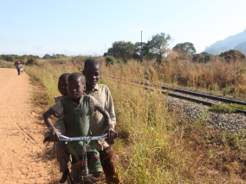Speeches Shim
OVERVIEW
Nearly 12 million children in Sub-Saharan Africa have lost one or both parents to AIDS. Many more children have been made vulnerable because of family illness and the widespread impact of HIV/AIDS on their communities. OVCs are more vulnerable to abuse and exploitation and are also more likely to engage in unsafe behaviors, increasing the risk of HIV infection. Targeted OVC interventions, linked with broader development efforts around education, food and nutrition, and livelihood assistance, contribute to reducing the risk and impact of HIV/AIDS on the most vulnerable population in Mozambique.
PROGRAM DESCRIPTION
SDS-OVC-MZ aims to strengthen the capacity of families and communities to care for and protect the children in their care. The activity will take a family-centered approach through a set of interventions that will: strengthen families and communities; build resilience; and create a fostering environment for a healthy physical, social and emotional development of children.
EXPECTED RESULTS
- Increased utilization of quality social, health and nutritional services – work with networks of community providers to strengthen their capacity to initiate and retain clients in HIV and other care and refer them for onward services.
- Reduced economic vulnerability of OVC households –support OVC households to access financial products and services through Village Savings and Loans (VSL) groups; connect mature VSL group members to Farmer Field and Business Schools and markets; and transform economic resource allocation in the household in favor of OVC.
- Improved early childhood development (ECD) services – implement low cost, high impact mutually reinforcing activities to promote household and community based ECD stimulation and nutrition activities.
- Strengthened capacity of district governments and communities – focusing on critical government and community systems, structures and services, develop both their organizational and technical capacity to provide and refer for services, and to manage individual and family cases.


Comment
Make a general inquiry or suggest an improvement.